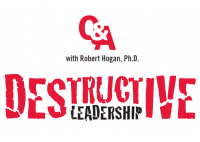Destructive leadership
08 Feb 2013
What is destructive leadership?
Leadership is the ability to build and maintain a high-performing team. Destructive leadership undermines or destroys a team’s effectiveness.
What do destructive leaders do?
A destructive leader’s impact depends on his or her level in an organizational hierarchy:
Destructive First-Line Leadership. First-line super-visors destroy teams by alienating subordinates through a series of destructive behaviors – bullying, harassing, exploiting, lying, betraying, and manipulating.
Destructive Mid-Level Leadership. Mid-level leaders can destroy their teams by exhibiting the same behaviors listed for first-line leaders and by making bad tactical decisions – that is, through exercising bad judgment. Bad judgment negatively impact moral and erode subordinates’ trust.
Destructive Senior Leadership. Senior leaders can be the most destructive. In addition to the behaviors listed for first-line and mid-level leaders, senior leaders are responsible for making strategic decisions. Bad strategic decision-making can ruin teams, companies, and even countries.
Why do destructive leaders do what they do?
Most people behave badly because they are preoccupied with their own agendas and are unable or unwilling to consider how their actions might affect others. There are two causes of self-centered behavior:
Insecurity. Insecure leaders lack confidence and react emotionally to real and imaginary perceived threats. If a subordinate makes a mistake that may reflect badly on the leader, they may react angrily and disproportionately to the subordinate’s mistake. When confronted with data indicating that they have made bad decisions, they could explode and blame the mistake on external factors.
Arrogance. Arrogant leaders have too much confidence, and see others, especially subordinates, as objects to be used for their own purposes. They feel entitled to exploit and abuse their subordinates because the subordinates are existentially unworthy. When confronted with data indicating that they have made bad decisions, they typically ignore the feedback and say it is time to move on.
What can companies do to prevent destructive leadership?
Fortunately, organizations aren’t powerless against destructive leadership. Using personality assessments, organizations can identify destructive tendencies, screen out hazardous candidates, and provide incumbent leaders with the strategic self-awareness necessary for success.
Dr. Robert Hogan, founder of Hogan Assessment Systems, is recognized as an international authority on personality assessment, leadership, and organizational effectiveness. He has authored more than 300 journal articles, chapters, and books, and is widely credited with demonstrating how personality factors influence organizational effectiveness.





